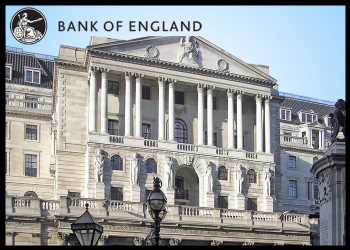The Bank of England decided to intervene in the government bond market to reduce any risks from contagion to credit conditions for the real economy, following the chaos developed in the currency and gilt markets after the government’s massive tax cuts announced in the ‘mini-budget’ last Friday.
The UK government also came under pressure from the International Monetary Fund that in a rare move, voiced criticism against the tax cuts and the fiscal package.
The bank said it is monitoring developments in the financial markets very closely, as announced at the start of the week, in light of the significant repricing of UK and global financial assets.
“This repricing has become more significant in the past day – and it is particularly affecting long-dated UK government debt,” the BoE said in a statement on Wednesday.
“Were dysfunction in this market to continue or worsen, there would be a material risk to UK financial stability.”
That would lead to an unwarranted tightening of financing conditions and a reduction of the flow of credit to the real economy, the central bank warned.
In order to restore market functioning and avert the risk of contagion, the bank decided to undertake temporary purchases of long-term government bonds from September 28.
The purchases will be carried out on whatever scale that is necessary to restore orderly market conditions, the central bank added.
The “temporary and targeted” purchases will be fully indemnified by HM Treasury.
The bank stressed that the purchases in the gilt market would be “will be strictly time limited” and are meant to tackle a specific problem in the long-dated government bond market.
Auctions will be carried out till October 14.
In addition, the BoE postponed the selling of bonds held under the quantitative easing program to October 31, which was initially due to commence next week.
The MPC’s annual target of an GBP 80 billion stock reduction is unaffected and unchanged, the bank said.
After the pound hit a record low on Monday, the BoE Governor Andrew Bailey said the central bank is ready to alter its interest rates by as much as needed to bring the inflation back to the 2 percent target.
The same stance was reiterated in the latest statement from the central bank.
Since the start of this week, markets are expecting a non-scheduled interest rate hike from the BoE if the currency situation does not improve.
The government bonds remained under severe selling pressure amid concerns over the sustainability of public finances.
Following the BoE intervention, the UK gilt prices soared on Wednesday.
The pound had weakened to a record low over the weekend against the U.S. dollar after the new Treasurer Kwasi Kwarteng’s mini budget announcement last Friday, which included massive tax cuts and an energy price guarantee.
The IMF urged the UK government to reassess its debt funded tax cuts.
An IMF spokesman said late Tuesday that the lender is closely monitoring recent economic developments in the UK and said it “does not recommend large and untargeted fiscal packages at this juncture.”
Kwarteng’s so called new ‘growth plan’ to achieve a growth target of 2.5 percent came under severe criticism after the announcement jolted the gilt and currency markets on concerns over inflation and financial stability.
The bond purchases provided a potential exit door to the nascent UK financial crisis, though this may require the Bank to go even further, economists at ING said. Purchases should and will last longer than the initial two weeks, they added.
Nevertheless, ING economists observed that an inter-meeting rate hike remains unlikely despite ongoing concerns about sterling weakness.
Source: Read Full Article
-
FCC Chairwoman Jessica Rosenworcel Roots For Election To Help Break 2-2 Tie On Commission, But Defends Her Record In Running Deadlocked Regulatory Body: “We’ve Turned The Noise Down”
-
Thailand GDP Growth Exceeds Expectations In Q1
-
Tata Motors turns the corner: Swings into profit after 7 quarters
-
Dianne Feinstein Taken To Hospital For Brief Stay After Falling At Her Home
-
U.S. Stocks Moving Mostly To The Upside

